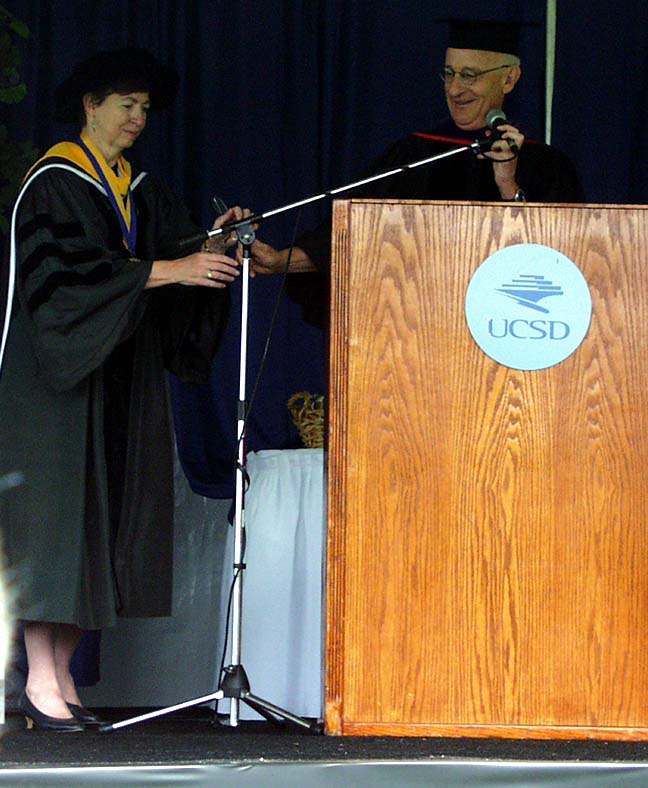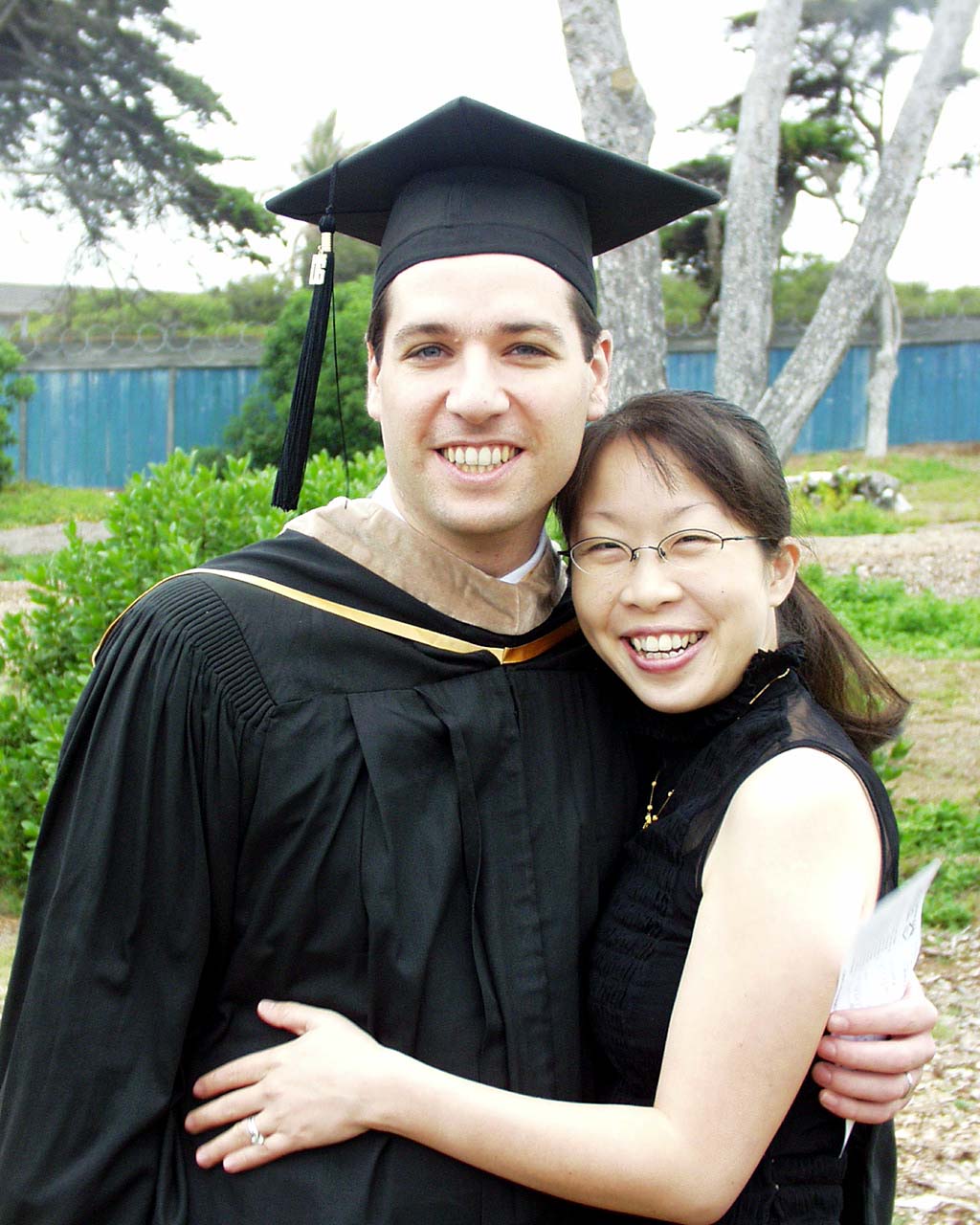By Donald H. Harrison
DEL MAR, Calif. — The first graduating class of MBA's of the UCSD
Rady School of Management was jovially advised on Sunday, Aug. 21, by
the school's major benefactor, Ernest
Rady, to "find a job and make some dough!"
 Rady
recently sold his Irvine-based Westcorp, a bank and automobile finance
company, to Wachovia Corp. for nearly $3 billion, but still controls American
Assets, a conglomerate of companies in the field of financial services,
investment management and real estate assets. Additionally, he is
chairman of the Insurance Company of the West, which focuses on property and
casualty insurance.
Rady
recently sold his Irvine-based Westcorp, a bank and automobile finance
company, to Wachovia Corp. for nearly $3 billion, but still controls American
Assets, a conglomerate of companies in the field of financial services,
investment management and real estate assets. Additionally, he is
chairman of the Insurance Company of the West, which focuses on property and
casualty insurance.
From a stage constructed on a gently sloping lawn on a cliff overlooking
the Pacific Ocean—on a property purchased for a future residence by fellow
Rady School of Management benefactors, venture capitalist William & Carol
Stensrud—Rady shared with the 58 capped- and gowned-graduates the three
ingredients in his recipe for making that dough: "ideas,"
"capital," and "people."
Chancellor Mary Anne Fox adjusts microphone
for Ernest Rady at UCSD graduation ceremony.
Best known in San Diego as the benefactor who donated $30 million to start the
UCSD's School of Management, and more recently $60 million to support the work
of Children's Hospital, which was renamed Rady Children's Hospital in his
honor, the Jewish philanthropist said students should try to live up to what
has become the school's motto: "Transforming innovation into
revolutionary change."
"Our world is being powered by a supercharged engine, fueled by new ideas
and technologies," he said. "It wasn't so long ago that the net was
something needed just for fishing or basketball, java was a cup
of coffee, surfing was a sport involving water, and yahoo was a
lame cheer from forgettable old movies from the Old West."
In his own start-up day, about 35 years ago, "I saw an opportunity for an
auto finance company... providing auto loans to prime and non-prime
borrowers," Rady said. "I started the company with $850,000 in
capital and grew our company in excess of $17 billion in assets and $7 billion
a year in annual originations, a company that Wachovia purchased. My
point isn't so much the numbers but rather the idea. You don't have to
discover the next gadget or cure a disease—although that would be
great. There still remain untapped business markets in and around the
city, state, country and world that seek your intellect and skill."
 In
what must have been the second-best piece of news for the students behind
notification that they had graduated, Rady said there is an excess of money
available in the world today for capital investment, an unusual situation that
has led to "increased competition for investments."
In
what must have been the second-best piece of news for the students behind
notification that they had graduated, Rady said there is an excess of money
available in the world today for capital investment, an unusual situation that
has led to "increased competition for investments."
"This imbalance may prove strategic to you and your future business
success, especially those of you who are in entrepreneurial start ups possibly
finding it much easier to raise capital to fund your own company," Rady
said. "For others, you may find yourself pushed harder, challenged
beyond the norm to realize the higher returns that the investment community
seeks.
"Nevertheless, inherent in either situation is the need for you to
maintain your ethics, morals and values," the
UCSD Rady School MBA David
Harrison is congratulated by his
wife, Hui-Wen, who also has connection to a Rady philanthropy;
She works as a decision support analyst for
the Rady Children's
Hospital. The Author of this story proudly
acknowledges that
David is his and Nancy's
son. Mazal tov!
philanthropist stressed. The stage at which you contemplate compromising
these, that is the stage at which you lose your credibility, integrity, sense
of self-worth, and, I believe, substantially reduces your chances of
success."
The benefactor said as important as ideas and capital are to a business,
"people are by far the most important element in any business
success...Good people can make a bad business good, and a good business
better." Recognizing this, businesses are investing more and more in
their people— many, for example, permitting their employees to take time off
to attend such programs as UCSD's MBA program. Furthermore, he said,
businesses more and more are looking at employees as "associates"
rather than as "workers."
"Businesses have given a new sense of value to persons, guided at least
in my companies by the utmost of ethical and moral responsibility," Rady
said. "Each person is seen for their full potential creativity and A-plus
attitude..."
Rady and his wife Evelyn,
have been workers, volunteers and financial contributors to various Jewish
institutions in San Diego County, and those who have known him since his days
as a president of the United Jewish Federation (1980-1981) were not surprised
by the way he returned in his speech to the importance of ethics, values and
morals.
Honored guests at the graduation ceremonies—seated just behind the graduates
themselves—were other philanthropists who have contributed to UCSD and to
the Rady School, among them such members of the Jewish community as Pauline
Foster and Arthur Brody. Foster, in fact, had succeeded Rady as UJF
President (1981-1982) and recently donated $5 million to the School of
Management to endow the chair now held by the Rady School's dean, Dr. Robert
Sullivan. Brody, founder of the Brodart Corp, known best for the book
coverings used by libraries, is the treasurer of the UC San Diego Foundation.
 Some
other contributors to the school from the San Diego Jewish community include
Joan and Irwin
Jacobs, Sheryl and Harvey White (both families of Qualcomm); Daniel and Phyllis
Epstein (ConAm Management), and Jerome
Katzin (retired Lehman Brothers managing director).
Some
other contributors to the school from the San Diego Jewish community include
Joan and Irwin
Jacobs, Sheryl and Harvey White (both families of Qualcomm); Daniel and Phyllis
Epstein (ConAm Management), and Jerome
Katzin (retired Lehman Brothers managing director).
During the ceremony, graduates and guests were saluted by what some members of
the Rady bunch dubbed the "Del Mar Air Force" — a fly-over by a
squadron of seagulls in "V" formation.

